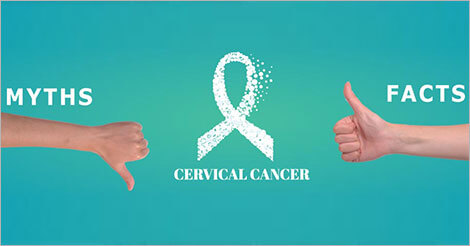
Read on to debunk some of the common myths and misconceptions surrounding cervical cancer and Pap smears. Call your local clinic now to book your smear test.
Debunking 5 Common Myths About Cervical Cancer (H1)
Cervical cancer is one of the most common forms of cancer in women, affecting approximately 13,000 Americans each year. But, in the last 40 years, the number of cases and deaths due to this disease has significantly declined ever since women started taking regular Pap smears.
Although there’s an abundance of information found online about cervical cancer, there are still plenty of myths that surround it, especially regarding smear tests and the human papillomavirus (HPV). Here are 5 common myths about cervical cancer and Pap smear in Twin Falls Idaho, debunked:
Myth #1: Women Need to Get a Pap Test Every Year
Annual smear tests aren’t recommended for a woman at average risk. If the initial Pap and HPV tests show normal results, then there’s no need to take them every year. According to medical experts, getting a regular Pap smear should start when a woman reaches 21 years old. How often they should undergo the tests also depends on their age.
- Ages 21-29: Pap and HPV tests every 3 years
- Ages 30-64: Pap and HPV tests every 5 years
- Ages 65 and above: A Pap smear is no longer needed, although it’s still best to consult a doctor regarding this.
Apart from age, other risk factors may also require an individual to take more frequent Pap smears. These include:
- Having a weak immune system because of chemotherapy or organ transplant
- Having an HIV infection
Myth 2: Cervical Cancer Is Hereditary
A lot of people assume this since most cancers common in women—such as breast and ovarian cancer— are passed down from parent to child. But, cervical cancer is not hereditary. Having a relative who has this condition does not increase an individual’s risk of developing it.
Most cervical cancers are actually caused by HPV, which is spread through sexual contact with another individual infected with the virus. The best way to avoid developing cervical cancer is to get a regular HPV vaccine and practice safe sex.
If an individual is too old to receive an HPV vaccine, it’s important to get regular Pap smears. This will help the doctor detect early signs of cervical cancer before it fully develops.
Myth #3: A Pap Test Isn’t Necessary if There Are No Symptoms
A Pap smear’s purpose is to look for abnormalities in an otherwise healthy body. This is because women with abnormal cervical cells usually don’t experience any symptoms. But, these abnormal— and possibly cancerous— cells can be detected through screening.
The changes in the cervix that lead to cancer can take place within a decade without showing any symptoms. By the time a woman starts experiencing any signs, cervical cancer has already fully developed. That’s why it’s crucial not to wait for any symptoms to appear before visiting a doctor.
Myth 4: Women With Cervical Cancer Can’t Have Children
Women diagnosed with cervical cancer usually undergo a hysterectomy, chemotherapy, and radiation therapy to the pelvic area, which can affect their fertility. But, there are actually plenty of new treatments that can preserve the patient’s fertility.
One of them is a radical trachelectomy, which is a conservative surgery that removes the cervix and upper vagina while retaining the uterus. This makes it possible for the patient to still bear children after the procedure.
Doctors can also use assistive reproductive technologies to freeze the eggs and embryos. If radiation is necessary, the ovaries can also be moved surgically so it will be out of the radiation field’s reach.
Myth #5: Pap Smears Are Unnecessary if the Person Is Vaccinated
Having an HPV vaccine significantly lowers the risk of getting cervical cancer. But, it doesn’t provide complete protection. The best vaccine covers 9 strains of HPVs, which account for 95% of cervical cancers. This leaves 5% of HPV strains that can still lead to the development of cancerous cells.
Even though there’s already a vaccine for HPV, it’s still a very widespread disease. Approximately, 80% of men and women are affected with this virus at some point in their life. So, getting regular screenings is still the best way to reduce risks and get maximum protection.
Debunking these widespread myths and misconceptions is a great way of spreading awareness about cervical cancer. It can also help remove the stigma around HPVs and screenings. So, get in touch with your local family clinic and take your first step in fighting this disease by booking a Pap smear Twin Falls, Idaho.